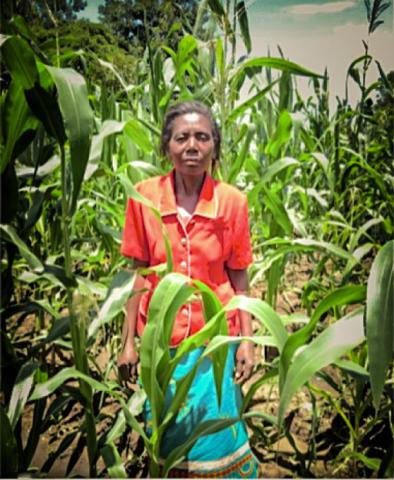Raising Hope Amid Difficult Realities
At 47, Magret Mcheka from Traditional Authority (TA) Sitola in Machinga District, has endured more tough times than most people would expect in a lifetime. In 2010 she lost her mother and husband, leaving her with four children to raise. Her health started deteriorating and she consequently discovered that she is HIV positive. This, however, did not deter her from striving to give the best to her children and she started brewing kachasu, a local beer. Even though she generated money (at least up to MK4000, about $5, on a good day), the business brought shame and ridicule to her.
“My house turned into a beer hall and people called me a prostitute,” she says adding that beer brewers are considered loose women in her community. In addition, Machinga, just like many other districts, experienced two consecutive years of poor harvests in 2015 and 2016, as a result of unreliable rains. Life for Margret and her children got even tougher.

In 2016, however, Margret began rewriting her life story when she was selected as a beneficiary under a DFID supported emergency response programme.
“When the humanitarian response programme was enlisting beneficiaries, I opened up and told them the problems I face on a daily basis and I was selected,” she says.
Through the programme, Margret has been receiving cash – enabling her to buy food and other household items on a monthly basis. Margret also received maize and other seeds for planting and training to make the most with farming. This support gave her enough reason to quit beer brewing and focus on farming. The response programme also has a Village Savings and Loans (VSL) component to it, which has encouraged Margret to save. According to Margaret, this has changed her family’s life for the better.
“Kumbukani my last born is in standard 6. He is a very intelligent child and wants to be a doctor. Because of this programme he goes to school every day on a full stomach and comes home at 2:30pm to find food waiting for him. I was so desperate, a destitute in this village, brewing beer for for those that partake in the strong drink. Now I am a farmer, I have energy to farm every day because there is always food in my house,” she says with tears of joy in her eyes.
Magret Mcheka’s story is an inspiration and demonstrates the impact the DFID resilience programme is having on people in Machinga. More important is the knowledge and skills these people are receiving through the livelihoods programme, which they have promised they will use every season as they farm.
Change like that of Magret Mcheka is an indication that building resilience is indeed possible. The DFID humanitarian programme has managed to change Margret’s coping mechanisms.
Written by Lawrent Kumchenga, Communications & Advocacy Specialist
 Malawi
Malawi